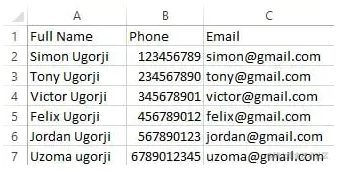PHP读取和写入CSV文件的示例代码
目录
- 1. 什么是 CSV 文件
- 2. 从 CSV 文件中读取数据
- 3. 将数据写入 CSV 文件
1. 什么是 CSV 文件
CSV(逗号分隔值)文件是使用逗号分隔信息的文本文件。该文件的每一行都是一条数据记录,也就意味着它可以用于以表格的形式展现信息。
2. 从 CSV 文件中读取数据
我将使用内置函数 file 从 CSV 文件中读取数据,然后使用 str_getcsv() 解析包含逗号的字符串。
在介绍如何使用str_getcsv() 函数之前,我想向你介绍如何输出 CSV 文件中的数据。
<?php if($_FILES){var_dump(file($_FILES["file"]["tmp_name"], FILE_IGNORE_NEW_LINES | FILE_SKIP_EMPTY_LINES)); }?><html> <body><form method="post" enctype="multipart/form-data"> <input type="file" name="file" /> <button>upload</button></form> </body></html>当我使用上面的代码上传文件时,输出以下数据:

如图所示,每个字符串中都有逗号,每个逗号将一条信息与另一条信息隔开。
使用 array_map() 函数,并且 str_getcsv() 作为回调函数,该回调将解析每个具有逗号的字符串并将它们分隔在一个数组中。
if($_FILES){ //loop through the csv file into an array $theCSV = array_map("str_getcsv", file($_FILES["file"]["tmp_name"], FILE_IGNORE_NEW_LINES | FILE_SKIP_EMPTY_LINES)); //dump result var_dump($theCSV);}输出如下:

输出的数据看起来比之前要好得多,我们将列标题(全名、QQ、电子邮件)作为该数组的第一个元素。
我们使用 array_walk() 函数遍历此数组 ,然后提供一个回调函数,它将列标题(全名、QQ、电子邮件)和每个 CSV 数据组合为一个新数组。
if($_FILES){ //loop through the csv file into an array $theCSV = array_map("str_getcsv", file($_FILES["file"]["tmp_name"], FILE_IGNORE_NEW_LINES | FILE_SKIP_EMPTY_LINES)); /*Walk through the array and combine the headers which is the first element of our csv array with the rest of the csv data*/ array_walk($theCSV, function(&$ary) use($theCSV) {$ary = array_combine($theCSV[0], $ary); }); //dump result var_dump($theCSV);}?>注意,在上面的回调函数中,我使用了变量& 运算符将 $ary 通过引用传递给函数,这使的我们可以修改原始数组。当我们运行上面的代码时,这就是我们的 CSV 数组现在的样子:

注意这里有个问题:这个新数组的第一个元素是表头,因为我们之前让它与 CSV 数组的其他数组组装在了一起。可以使用 array_shift() 来解决这个问题。
if($_FILES){ //loop through the csv file into an array $theCSV = array_map("str_getcsv", file($_FILES["file"]["tmp_name"], FILE_IGNORE_NEW_LINES | FILE_SKIP_EMPTY_LINES)); /*Walk through the array and combine the headers which is the first element of our csv array with the rest of the csv data*/ array_walk($theCSV, function(&$ary) use($theCSV) {$ary = array_combine($theCSV[0], $ary); }); //remove column headers which is the first element array_shift($theCSV); //dump result var_dump($theCSV);}这就是我们最终的 CSV 数组的样子

将上面的代码封装成一个函数,如下:
function readCSV($file){ if(empty($file) || !file_exists($file)) return; //store the column headers $headers = null; $theCSV = array_map("str_getcsv", file($file, FILE_IGNORE_NEW_LINES | FILE_SKIP_EMPTY_LINES)); /*Walk through the array and combine the headers which is the first element of our csv array with the rest of the csv data*/ array_walk($theCSV, function(&$ary) use($theCSV, &$headers) { $ary = array_combine($theCSV[0], $ary); //store the headers $headers = $theCSV[0]; }); //remove column headers which is the first element of our csv array array_shift($theCSV); //return data return array("headers" => $headers,"data" => $theCSV );}3. 将数据写入 CSV 文件
将数据写入 CSV 文件,其逻辑是使用 fopen() 函数以附加模式打开 CSV 文件, 然后用 fputcsv() 解析我们要写入 CSV 文件的数据,然后此方法将这些数据写入文件流当中。
if($_SERVER["REQUEST_METHOD"] == "POST"){ $file = "./my_csv_file.csv"; //loop through the csv file into an array $csvData = readCSV($file); //create array to store the new data $newData = []; //loop through headers and then add values as a new array foreach($csvData["headers"] as $index => $key){if($key == "Full Name"){ $newData[$key] = $_POST["full_name"];}elseif($key == "Email"){ $newData[$key] = $_POST["email"];}elseif($key == "Phone"){ $newData[$key] = $_POST["phone"];}else{ $newData[$key] = "";} } var_dump($newData);}如图所示就是我们将写入到 CSV 文件的数组的数据

在我们将这些数据写入到 CSV 文件之前,我们必须去掉 key,我们可以使用 array_values() 函数
if($_SERVER["REQUEST_METHOD"] == "POST"){ $file = "./my_csv_file.csv"; //loop through the csv file into an array $csvData = readCSV($file); //create array to store the new data $newData = []; //loop through headers and then add values as a new array foreach($csvData["headers"] as $index => $key){if($key == "Full Name"){ $newData[$key] = $_POST["full_name"];}elseif($key == "Email"){ $newData[$key] = $_POST["email"];}elseif($key == "Phone"){ $newData[$key] = $_POST["phone"];}else{ $newData[$key] = "";} } //open the csv file as in append mode $fp = fopen($file, "a+"); //remove keys from new data $newData = array_values($newData); //append data to csv file fputcsv($f, $newData); //close the resource fclose($fp);}不出意外的话,数据就会成功写入到 CSV 文件当中去了。

以上就是PHP读取和写入CSV文件的示例代码的详细内容,更多关于PHP CSV文件的资料请关注其它相关文章!

 网公网安备
网公网安备